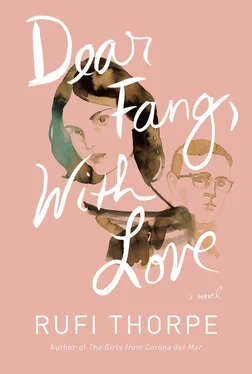I was unsure if I was hearing Darius correctly. No one else in the group guffawed — they were all listening patiently. No one seemed amazed that in Lithuania, in order to deal with the end of communism, local artists had made a statue of Frank Zappa. It didn’t seem to strike anyone but me as odd or wonderful or funny. Vera whispered, “Who is Frank Zappa?”
“And now Frank Zappa has become sort of a patron saint, if you will,” Darius said, “of Užupis, but also of Vilnius and even Lithuania as a whole.” He paused again, squinting in the bright sun. “This area,” he gestured around us, “was really just a slum. These warehouses were filled with homeless, with prostitutes. The artists who founded Užupis were mostly squatters living in these buildings. There had been no life for them under communism. They just, well, mainly they drank all the time. They used to call alcohol ‘ink.’ They would say, ‘I have to go to the store and get more ink,’ because they really believed that drunkenness and the artistic process were one and the same. A lot of those guys are dead now. They all died very early from liver failure. It was very sad, but, I guess — well! I guess they did it to themselves, you could say.”
As we continued along, I could feel Vera buzzing with excitement. She loved it here. She kept exclaiming in wonder over murals, pointing out hidden statues to Judith. This was exactly the sort of place she always dreamed existed, the sort of place that could never come into being in safe, ordinary Rancho Cucamonga.
On one of the pockmarked walls on a narrow cobblestone street the constitution of Užupis had been translated into twenty languages and then engraved on great slabs of shining mirrored metal so that as you read them, you had to face yourself in the mirror. The items ranged from the profound to the whimsical.
Everyone has the right to live by the River Vilnia, while the River Vilnia has the right to flow by everyone.
Everyone has the right to be idle.
Everyone has the right to love and take care of a cat.
Everyone has the right to look after a dog till one or the other dies.
A dog has the right to be a dog.
A cat is not obliged to love its master, but it must help him in difficult times.
Everyone has the right to sometimes be unaware of his duties.
Everyone has the right to be happy.
Everyone has the right to be unhappy.
Everyone has the right to be silent.
Everyone has the right to have faith.
No one has the right to violence.
Everyone has the right to encroach upon eternity.
It ended with these simple instructions:
Do not fight.
Do not win.
Do not surrender.
“Hi,” Susan said, coming up beside me. Vera was a few paces away, reading the constitution printed in Russian with Daniel, and maybe that was why Susan had decided to approach me.
“Hi,” I said. We stared at the constitution, which also meant staring at ourselves in the mirror. I was uncommonly sexually attracted to her. It was uncanny. It was frankly uncomfortable because at the same time she did strongly remind me of my mother. The silence stretched between us so long that it became surreal and suddenly anything could have been on the table. I could have reached over and kissed her. She could have reached over and honked my nose. Or punched me in the face. Or grabbed my crotch.
“How are you?” she asked. It was such a female question. The other famous female question being: What are you thinking? “How are you?” was the easier of the two to answer.
“Disoriented,” I said. “How are you?”
“Dizzy,” she said. We stared at each other some more. It was hot out. I wanted a beer. I wanted to be alone with her at a picnic table in the shade by the river drinking a beer. “I couldn’t sleep all last night,” she said.
I nodded. “The long days have been throwing me off. I keep waking up at four in the morning.”
“But isn’t that why we travel? To get disoriented. To be changed.”
“What do you think about this?” I said, gesturing at the constitution in front of us, but then more loosely to the buildings around us, to the project of Užupis.
“I think it’s kind of wonderful,” she said.
“See, I think I’m just being a stick in the mud.”
“How are you being a stick in the mud?” she asked, nudging my shoulder with hers.
“I’m suspicious of it. I’m suspicious of the whole thing: alcohol as ink and this faux free society where everything is a joke at the same time as it is for real and everyone is a drunk or a whore but with a heart of gold. I mean, was the poetry they wrote any good? Were their paintings really good? I don’t know.” I didn’t like the world of Dr. Carmichael, the world sucked dry of anything that might be magic — but I wasn’t willing to live in this world, either.
“Oh, I think that’s a fair question,” she said. “I don’t think that’s you being a stick in the mud.”
“Hmm…” I said. But I knew that what bothered me about Užupis was that it reminded me of the farm.
“You disappeared the other night,” Susan said. “I hope I wasn’t too forward in asking you to dinner.”
“No, not at all,” I said. But I didn’t say anything else and she didn’t either. We just continued to linger, standing next to each other, waiting for the group to be led wherever we were going next. I looked over at Vera. She was laughing up into Daniel’s face with his arm around her. I wondered what it meant, what it meant about her and Fang. And what had ever happened to her crush on Johnny Depp? It was almost as though Daniel had simply stepped into the vacuum created by Vera’s initial desire.
Surely Daniel didn’t realize she was only seventeen. I would have to have a talk with him. I didn’t want to embarrass Vera by being too direct about it, but I could at least make him aware that she was so young. Although it occurred to me that I could choose not to. That I could just let myself slip into this prickling, delicious dream. That I could give in to the part of myself that wanted to lick Susan’s sternum even though she looked like my mother. That I could order a beer in Užupis and watch the River Vilnia flow past. That I could let my daughter, who was now sane, no longer my charge but a person in her own right, a young woman, just a few months shy of eighteen, that I could let her flirt with a handsome young man in a pirate shirt in the town where my grandmother had been born.
What could go wrong? What was it that I was so terribly afraid of?
—
After darkly pointing out a memorial marking a Jewish cemetery destroyed by the Soviets, Darius returned us to the central square of Užupis and set us free to go find dinner. Susan and I stayed close to each other, wordlessly willing ourselves to wind up in a cluster of people who would all go to dinner together. Vera and Judith and Daniel drifted over. Everyone was chatting. A small man named Kenneth who had a reddish beard and thick plastic bifocals inserted himself into our group. He was in his mid to late forties, old enough that I never interpreted him as a peer, and truthfully, I had been avoiding Kenneth for reasons obscure to me. If I hadn’t been under some peculiar spell, standing there with Susan, I would have simply taken Judith and Vera and gone off on our own for dinner as we did most nights. I hated splitting the bill in a big group. But Kenneth was very friendly. He was from Kentucky. He clapped his hands together. “Let’s go!” he said. “I know a great little place!”
And so we all allowed ourselves to be led blindly by this man whom none of us knew. We were tired and no one made a lot of conversation as we followed him. Daniel had sweated through his maroon silk pirate shirt in big dark circles at the armpits.
Читать дальше












